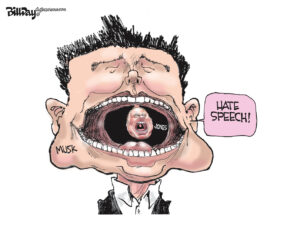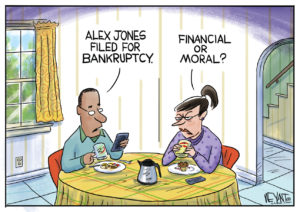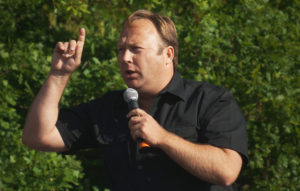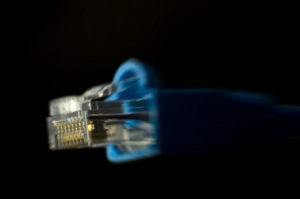Is Devin Nunes an American Hero or Trump’s New Coffee Boy?
For all the hype, the Nunes memo was a legal dud that may cost the congressman from California. House intelligence committee chairman Devin Nunes, R-Calif., arrives for a meeting at the Capitol in Washington, D.C., in January. (Andrew Harnik / AP)
House intelligence committee chairman Devin Nunes, R-Calif., arrives for a meeting at the Capitol in Washington, D.C., in January. (Andrew Harnik / AP)
It’s not a lie if you believe it.
—George Costanza, “Seinfeld”
What a difference the election of Donald Trump has made for Devin Nunes. Once an obscure Republican congressman from Visalia, Calif., 40 miles south of Fresno, Nunes is now a household name. He’s the man behind the House intelligence committee’s memo on alleged abuses committed by the FBI and the Justice Department under the Foreign Intelligence Surveillance Act (FISA) in connection with surveillance conducted on former Trump campaign adviser Carter Page in 2016 and 2017.
The memo was declassified and released last Friday, after a frenzied buildup on cable news rivaling the breathless press dispatches of 1932 on the kidnapped Lindbergh baby. The memo was made public, along with a two-page letter written by White House counsel Donald F. McGahn II to Nunes. It set forth the president’s broad legal authority to declassify government documents and gave Nunes the green light for disclosure.
For his role in leading the #ReleaseTheMemo crusade, Nunes has been lionized by the president and his sycophants as a “hero” of civil liberties and government transparency. In the fever swamp of Trumpland, it is hoped that the memo will shield the president at long last from special counsel Robert Mueller III’s investigation into Russian meddling in the 2016 election. Some, like Infowar’s Alex Jones, the right’s raging high priest of conspiracy, even see the memo as the spark that will eventually bring the “deep state” to its knees.
In reality (an endangered species in Trumpland), Nunes is by no means a political hero, much less a serious student of the Constitution. The Sacramento and Fresno Bee newspapers recently ran a joint editorial dubbing him Trump’s “stooge.” I prefer to see him, more charitably, as the president’s new “coffee boy.”
For all its hype, the Nunes memo is the kind of work product you’d expect from a coffee boy—something capable of yielding a quick caffeine high, but followed by an inevitable letdown. The memo was prepared by Nunes and his staff, with possible direct input from the White House, and is a scant three and a quarter pages long.
The memo is devoid of supporting evidence, and entirely conclusory as to official misdeeds. It demonstrates some understanding of FISA’s surveillance procedures, but little, if any, mastery of the Fourth Amendment’s search warrant requirements. It’s as if the drafters of the memo are either ignorant of the applicable law or are counting on the public’s ignorance of the law to gain acceptance of the memo.
From a legal standpoint, the memo is a dud. Politically, it will likely also prove to be a dud, forgotten in a month and ultimately consigned to a footnote in the history of the Mueller probe.
Nor will the Nunes memo do anything to encourage a meaningful—and needed—reappraisal of the FISA court system and the enormous surveillance practices it authorizes. It won’t do that because it isn’t meant to. It is cynically designed solely to protect the president from Mueller’s inquiry, which appears to be growing stronger by the day, especially with regard to possible obstruction of justice by the president. It also is designed to lay the groundwork for firing Mueller’s supervisor in the Justice Department, Deputy Attorney General Rod Rosenstein.
Before returning to the content of the Nunes memo, a word about the man: Not long ago, Nunes was as obsessed with Russian intervention in American democracy as Rachel Maddow.
In a July 2014 Op-Ed published by the National Review online and titled “Don’t Shackle the NSA Now,” Nunes railed against the enactment of the then-pending USA Freedom Act. That legislation, which was signed into law in 2015, instituted some modest reforms to the FISA, including new limits on the bulk collection of telephone metadata, to enhance the privacy interests of Americans in the wake of Edward Snowden’s 2013 revelations about the surveillance programs run by the National Security Agency (NSA).
“[C]ontrary to popular perception,” Nunes wrote, “the NSA is not—and never was—recording or listening to millions of Americans’ phone calls. In short, unless you’re talking to a foreign-based terrorist, the NSA is not monitoring you.”
On Russia, Nunes insisted:
Our intelligence community is in a constant struggle to stay one step ahead of our adversaries, and if we scale back our intelligence activities, we can’t expect bad actors like Russia and China to respond in kind. Both these nations conduct wide-ranging spying operations that present a far bigger threat to U.S. citizens and U.S. businesses than do our own programs that counter them.
Lest anyone believe that Nunes has suddenly had a “come to Jesus” moment on civil liberties that led him to release the memo, it should be noted that he sponsored the recent reauthorization of section 702 of the FISA (codified at 50 USC section 1881), which permits the collection of electronic communications (emails, text messages and phone calls) of foreigners abroad without a warrant issued by a judge. As Snowden and civil-liberties advocates have long pointed out, however, such collection often sweeps up emails U.S. citizens write. [Note: The surveillance of Carter Page was not based on section 702, but on 50 USC section 1805, as the Nunes memo indicates.]
It should also be recalled that Nunes clownishly disgraced himself last March, holding a hastily convened news conference to announce that he had furnished Trump with information he had obtained from “a source” that confirmed the Trump Tower in Manhattan had been wiretapped during the campaign. It soon turned out, however, that the “source” consisted of two White House officials, which meant that the administration already possessed the information before it was turned over by Nunes and given back to the administration. The information remained as speculative and unreliable as before the sleight-of-hand.
Apart from bloviating about the NSA, Nunes has distinguished himself in the House as a staunch climate-change denier, a skeptic about California’s perennial water shortages, an Obamacare opponent and an enthusiastic supporter of the president’s Muslim travel bans.
Even a cursory reading of Nunes’ FISA memo is sufficient to discredit it. It is simply that skimpy and woefully drafted.
The first page of the memo is essentially a preamble, which declares the committee has uncovered a “troubling breakdown of legal processes established to protect the American people from abuses related to the FISA process.”
The memo then explains that the Foreign Intelligence Surveillance Court (FISC) issued its initial order approving an FBI and Justice Department application for electronic surveillance of Page on Oct. 21, 2016. The initial approval was, as per the terms of the statute, good for 90 days. Thereafter, the FISC approved three more applications, authorizing additional 90-day surveillance segments, which indicates (although the memo doesn’t explicitly state so) that the surveillance on Page probably continued through last October.
The memo emphasizes that Page is a U.S. citizen, and it explains that each surveillance application pertaining to him had been certified either by the director or deputy director of the FBI, and approved either by the attorney general (AG), deputy AG, or the assistant attorney general for national security. During the period Page was under watch, these job titles were held by such Trump nemeses as former FBI Director James Comey, former Deputy FBI head Andrew McCabe, former Deputy AG Sally Yates and Deputy AG Rosenstein.
The memo further explains that each surveillance application had to be accompanied by information to support a FISC finding of probable cause to believe that Page was acting as an “agent of a foreign power” in order for a surveillance order or renewal to be issued. Each renewal application also had to establish that any prior period of surveillance had produced positive results.
The memo does not explain the nature or origin of the FISC. The court was created by the original Foreign Intelligence Surveillance Act in 1978, and operates in closed sessions, usually hearing only from government attorneys. In some instances, the court may also receive input from a panel of independent attorney “public advocates,” established by the USA Freedom Act.
The FISC consists of 11 federal district court judges who serve maximum terms of seven years and are appointed by the chief justice of the United States Supreme Court. The current FISC consists of seven judges who were initially nominated to the federal bench by Republican presidents, and four who were nominated by Democratic presidents.
The memo does not tell us which FISC judges approved the Carter Page applications. Nor does it tell us that surveillance applications presented to the FISC can consist of hundreds of pages of supporting evidence, or that historically, FISC judges have approved about 99 percent of the warrant applications presented to them.
In a recent Fox News interview, Nunes admitted that he never personally read the applications on which his memo is based, although, he added, Rep. Trey Gowdy, R-S.C., his committee colleague, had reviewed the material.
Even more critically, the memo fails to explain why the FBI became interested in Page in the first place—i.e., that he is an investment banker who once worked for Merrill Lynch, he once lived in Moscow, and he has had decades of business dealings and relationships with Russian interests. The bureau first interviewed Page in 2013 after evidence had surfaced in an espionage case brought by the Justice Department in New York that indicated Russian agents had tried to recruit Page as an operative. No criminal charges were brought against Page.
Page became an adviser to the Trump presidential campaign in March 2016. In July, while still with the campaign, he traveled to Moscow and delivered a lecture at the New Economic School, in which he criticized U.S. sanctions against Russia. Page again traveled to Moscow in December 2016 during the presidential transition period.
The remaining pages of the memo list five “findings” reached by Nunes and his fellow Republicans on the intelligence committee. Basically, they assert that the infamous “Russia dossier” prepared by the British spy Christopher Steele at the behest of the Democratic National Committee (DNC) and the Hillary Clinton campaign formed an “essential part” of the Page FISA applications. Comey, McCabe, Yates and Rosenstein are faulted for failing to inform the FISC in the Page applications of the dossier’s provenance, or that Steele’s London-based consulting company was paid $160,000 for his research.
The memo finds that the applications concealed Steele’s bias against Trump, and implies that in the absence of the Steele dossier, the court would have rejected the Page FISA applications.
For good measure, the memo’s last finding states that the Page applications also contained information about Trump campaign adviser George Papadopoulos, the president’s first “coffee boy,” who has since pleaded guilty to lying to the FBI about his attempts to obtain political dirt on Hillary Clinton during the presidential campaign.
Astonishingly, as if undermining the memo’s central purpose, the last finding concedes that the FBI’s probe into Russian election interference was triggered by Papadopoulos’ misadventures, which began in March 2016, rather than anything Page may have done. The finding also asserts that the bureau’s Russia probe was opened by FBI agent Peter Strzok, who worked briefly with special counsel Mueller in July and early August last year and whose racy and sometimes anti-Trump text message exchanges with his mistress, FBI attorney Lisa Page (no relation to Carter Page), have become the stuff of “deep state” conspiracy ravings.
There are several fatal flaws in the Nunes memo that any competent second-year law student could spot:
First and foremost, we have no way of evaluating the reliability of the Page applications without seeing the actual applications or reviewing the transcripts of the court hearings before the FISC judges who approved them. Why would any rational person take the word of Nunes that the applications are defective when Nunes hasn’t even seen them himself?
Second, given the voluminous nature of most FISC applications, it is inconceivable that the Steele dossier formed the bulk of either the initial Page application or any renewal. The dossier is 35 pages long. It consists of 17 separate memos written between June and December 2016. It was still a work in progress when the first Page application was approved in October 2016.
Third, nothing in the Nunes memo alleges that any of the raw intelligence contained in the Steele dossier—which is concerned with Carter Page to only a minor degree—is untrue.
Fourth, like it or not, it is clear as a matter of law that a search warrant may be based on material supplied by an informant, even an informant who is biased against a target of law enforcement, provided the information supplied is otherwise corroborated and appears reliable under the totality of the relevant circumstances brought before the judge reviewing the request for the warrant. This is true in the ordinary criminal context as well as in espionage cases, as University of Southern California law professor Orin Kerr, a lifelong Republican and Fourth Amendment expert, explained in an online post published last week by the influential Lawfare.com website. The judicial standard for the issuance of a warrant is low and easily met—probable cause, not guilt beyond a reasonable doubt.
Fifth, given its track record in approving surveillance applications and Steele’s past history as an experienced and trusted British counterintelligence agent, it is highly unlikely that the FISC would have rejected the Page applications even if the DNC’s funding of Steele had been fully disclosed to the court. Even if the DNC was not mentioned by name in the applications, The Washington Post has reported that the FISC was told that the Steele dossier had been paid for by a political entity.
Sixth, even taking a leap of faith with Nunes and assuming the FISC would have rejected the Page applications if full and complete disclosure of the DNC’s funding of the dossier had been made, the surveillance on Page appears to be an insignificant part of the overall Mueller probe. Any errors committed regarding Page in no way undermine Mueller’s work. Indeed, following the release of the Nunes memo, Gowdy—the lone Republican to have seen the actual applications—sent out a series of tweets, one of which read:
As I have said repeatedly, I also remain 100 percent confident in Special Counsel Robert Mueller. The contents of this memo do not—in any way—discredit his investigation.
In the aftermath of the memo’s release, President Trump continues to fume about the Mueller investigation, and for good reason. Mueller is closing in on the president, no doubt focusing on the issue of obstruction of justice. Trump also may be enraged by the strong possibility—suggested by many experienced white-collar crime prosecutors—that Mueller has obtained his tax returns and is zooming in on the question of Trump’s financial ties to Russia and possible money laundering.
What all this will mean going forward for Nunes, as a result of the epic failure of his memo, remains to be seen. But it’s a safe bet that he will soon fall from Trump’s good graces, as other perceived losers over the course of Trump’s career in the private sector and his brief tenure in the Oval Office so often have.
To quote a once-popular reality TV show host, the president’s new coffee boy may soon hear the words, “You’re fired!”
Independent journalism is under threat and overshadowed by heavily funded mainstream media.
You can help level the playing field. Become a member.
Your tax-deductible contribution keeps us digging beneath the headlines to give you thought-provoking, investigative reporting and analysis that unearths what's really happening- without compromise.
Give today to support our courageous, independent journalists.





You need to be a supporter to comment.
There are currently no responses to this article.
Be the first to respond.